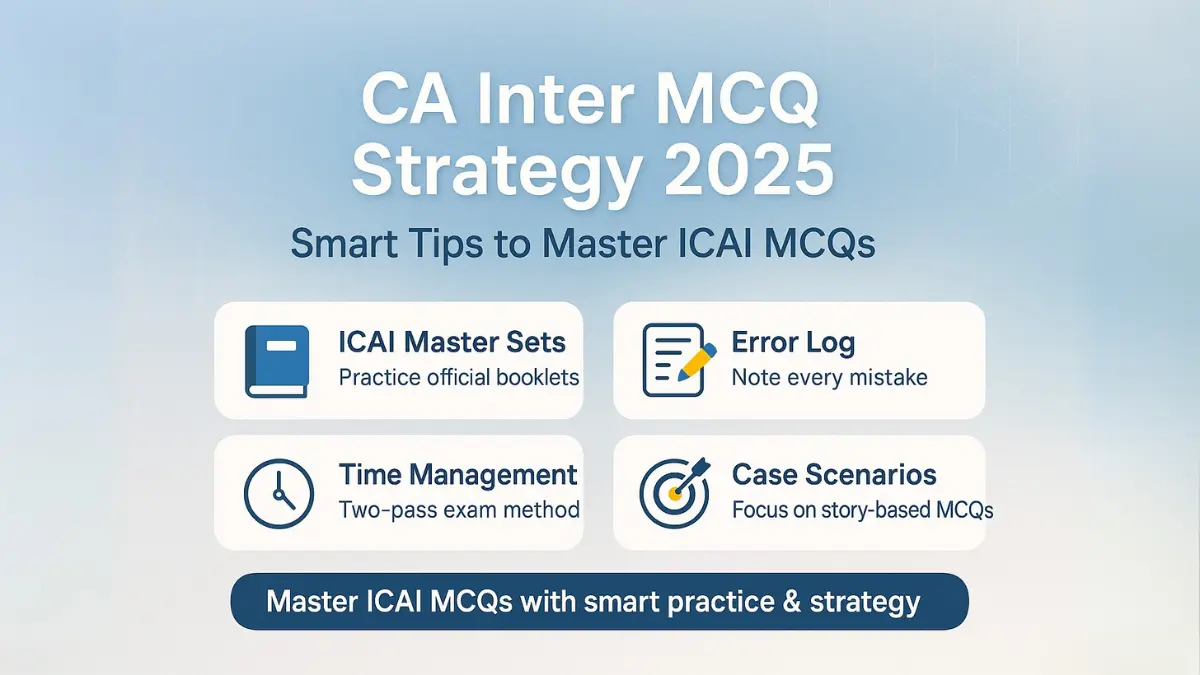Want a simple, bulletproof plan to score high in CA Inter MCQ papers? Read this — it’s practical, short, and built around what ICAI actually publishes and what top students do. Hook: follow these steps and you stop guessing and start scoring — from Day 1 to exam day.
What You Must Know First
- ICAI releases official MCQ master sets and answer keys after every attempt — use them as the gold standard for practice.
- Under the new scheme, a portion of MCQs are case-scenario based — practice story-style questions deliberately. (Refer official FAQs for scheme details.)
- ICAI publishes specimen answer books and OMR/sample formats — practice filling them to avoid sloppy mistakes in the exam hall.
- Past question papers for Inter are available on ICAI — they show real exam language and weightage.
- ICAI also posts MCQ booklets and case-scenarios booklets that closely mirror exam style — don’t ignore these.
Study Stack: What To Use
- ICAI MCQ master sets & case-scenarios (first priority).
- RTPs / MTPs / Revision test papers from ICAI and top trustable test-series.
- One good question bank per paper (with solutions you can understand).
- Short rulesheet — one A4 per topic with formulas, sections, and traps.
Weekly Routine
- Daily (45–60 min): 15–20 focused CA Inter MCQ practice on one topic → immediately check keys → write 1-line rule for each mistake.
- Weekly: 1 timed set (30–35 marks) under exam conditions + 1 error-log review session.
- Monthly: Full paper mock in OMR/specimen format. Mark exactly as in the hall.
How To Practice MCQs Like A Pro
- Read the stem first. Try to form an answer before looking at options.
- Underline facts: dates, rates, sections, ratios, years — MCQs hide traps in numbers.
- Eliminate fast: remove 2 options quickly; guess only if elimination narrows down to 2. (ICAI’s official guidance shows there’s no negative marking for Intermediate MCQs — aim to be smart, not random.)
- Case-scenario method: for story MCQs, list facts, find the controlling principle, map to accounting/tax/law provision, then pick the option.
Error Log & Micro-Revision
- Keep a Google Sheet or notebook with: Question, Why wrong, Rule, When to revise next.
- Every week, spend 15 minutes revising only error log items — this turns weak spots into memory.
Time Management — Exam Day Plan
- Two-pass approach:
- Pass 1 (fast): attempt all easy MCQs and mark medium ones; don’t waste >12–15 minutes on whole MCQ block.
- Pass 2: return to marked ones with calm; allocate remaining time by marks.
- OMR drill: practice filling OMR/specimen answer-book until it’s muscle memory — ICAI publishes specimen formats; use them.
Common Pitfalls & How To Avoid
- Ignoring official master sets — students who follow ICAI master sets know the examiner’s language and traps. Use them.
- Practising too many random MCQs without analysis — quality over quantity. Fix error-log first.
- Not practicing case-scenarios — allocate 30–40% of MCQ time to cases (they appear frequently under the new scheme).
Quick Checklist — Last 7 Days
- Re-do ICAI MCQ master sets for weak chapters.
- One full timed mock in specimen answer format.
- Revise 10 one-line rules from your error log each day.
- Sleep and light revision — avoid learning new tricky topics in last 48 hours.
Final Tip
- Treat MCQ practice as decision training: clear facts → define rule → eliminate wrong choices.
- Small habit: 1 MCQ explained aloud daily. If you can teach it, you know it.
This plan is built off ICAI’s official resources (MCQ master sets, case-scenarios, specimen formats and past papers) and practical routines top rankers follow. Use the official links and booklets as your base, keep an error log, practice OMR drills, and work case-scenarios deliberately — do this and your CA Inter MCQ performance will become predictable and repeatable.









